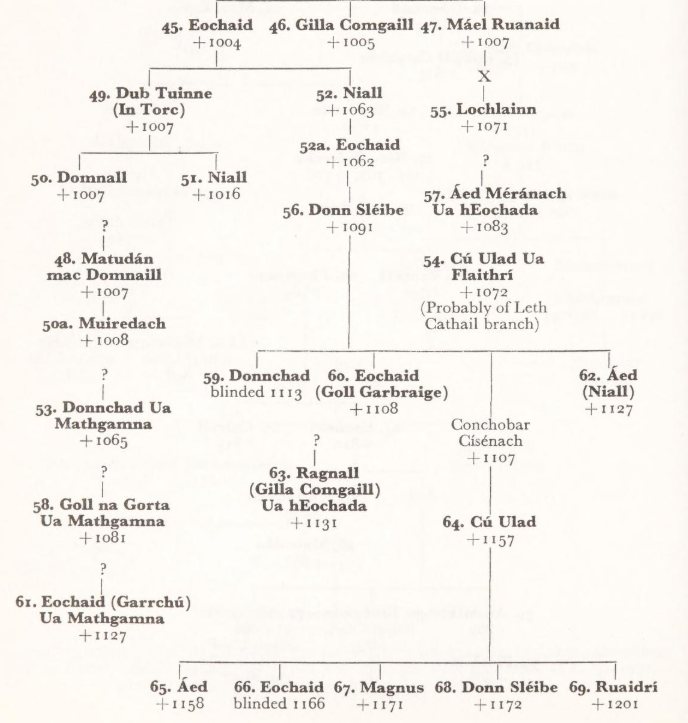Dál Fiatach kings from Eochaidh the son of Ardgal.

As late as 1084 the king of Ulaid, Donnsléibe mac Eochada, made a hosting to the Boyne and gave tuarastal (the royal gifts which were a token of suzerainty) to Donnchad Ua Ruairc, king of Bréifne. This was clearly an attempt to revive the ancient Fifth of Ulster by an alliance hostile to both the current rivals for the high-kingship, Donnnall Mac Lochlainn of the Northern Ui Néill and Tairrdelbach ua Briain, king of Munster. Byrne
The Dál Fiatach controlled the Uladh (Ulstermen) from the time of Christ, but by 1000 AD, they only held Antrim and Down. But they still were considered the Kings of Ulster by tradition. The newer Northern and Southern O'Neill grew in power and took the title High King of Ireland, but just after 1000 AD, Brian Boru defeated them and took the title of High King.
So, then the O'Neill tried to become kings of Ulster by annihilating the entire extended family (Dairfhine or True Family_of the Dál Fiatach king Eochaidh, the son of Ardhal. He is number 45 in the king list below. Five more kings were killed before 1016 when Niall took over and ruled until 1063 even outliving his co-regent son Eochaidh.
The overall family took the name O'hEochaidh after him. The 'h' is like the English 'n' in "an apple". There are 2 other Ua hEochadha (old spelling) in the king list and number 56 is Donsleibe (Dunleavy) Ua hEochadha.
Number 64, Cú Ulad (The hound of Ulster), took a new surname in 1137 after this Donsleibe and he and his 5 sons became the MacDunleavy. History records the last 6 kings of the Uladh as MacDunleavy, but it was just a man and his sons. They are recorded as moving to Donegal and acting as physicians to the kings under the protection of the junior branch of the Northern O'Neill who became their adversaries and so friends of the Dál Fiatach.
So that is Hoey and Dunleavy, but the text from Byrne explains the origin of McGough. Number 52 Niall mac Eochaidh ruled from about 55 years and saved and stabilized the Dál Fiatach so that they lasted until the Normans finally beat hem just after 1200. It is believed by some that his direct line took that name. Byrne notes Mac Eochada as MacCaughey but it is also McGough. The late Hugh McGough wrote of this on his site.
So the overall family was Hoey, the line of Niall mac Eochada became McGough, and the line of Cú Uladh became Dunleavy.
Green circles represent some number of Hoey households in that townland and blue represents McGough.
- Ancestry.com, "Ireland, Griffith's Valuation, 1847-1864"
- Townlands.ie, Geolocation files for maps.
- Byrne, Francis John (2001), Irish Kings and High-Kings, Dublin: Four Courts Press, ISBN 978-1-85182-196-9